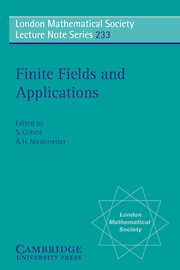 Finite Fields and Applications
Finite Fields and Applications Book contents
- Frontmatter
- Contents
- Preface
- Conference Participants
- Factorizations over finite fields
- Class number in totally imaginary extensions of totally real function fields
- Automorphism groups and permutation groups of affine-invariant codes
- A construction of bent functions
- Monodromy groups of classical families over finite fields
- Wan's bound for value sets of polynomials
- Comparative implementations of Berlekamp's and Niederreitor's polynomial factorization algorithms
- On the minimal polynomials for certain Gauss periods over finite fields
- Completely free elements
- Exponential sums over Galois rings and their applications
- Maximal sets of mutually orthogonal Latin squares
- Examples of small hybrid sums
- Cellular automata, substitutions and factorization of polynomials over finite fields
- A new class of two weight codes
- Construction of digital (t, m, s)-nets from linear codes
- A family of exceptional polynomials in characteristic three
- Estimates of character sums arising from finite upper half planes
- Carmichael-Carlitz polynomials and Fermat-Carlitz quotients
- Open problems and conjectures in finite fields
- Quasirandom points and global function fields
- Use characteristic sets to decode cyclic codes up to actual minimum distance
- Approximate constructions in finite fields
- Periodicity properties of kth order linear recurrences whose characteristic polynomial splits completely over a finite field, II
- Factoring cyclotomic polynomials over large finite fields
- Character sums and coding theory
- L-functions of algebraic varieties over finite fields: rationality, meromorphy and entireness
- Some congruences and identities for generalizations of Rédei functions
Maximal sets of mutually orthogonal Latin squares
Published online by Cambridge University Press: 29 September 2009
- Frontmatter
- Contents
- Preface
- Conference Participants
- Factorizations over finite fields
- Class number in totally imaginary extensions of totally real function fields
- Automorphism groups and permutation groups of affine-invariant codes
- A construction of bent functions
- Monodromy groups of classical families over finite fields
- Wan's bound for value sets of polynomials
- Comparative implementations of Berlekamp's and Niederreitor's polynomial factorization algorithms
- On the minimal polynomials for certain Gauss periods over finite fields
- Completely free elements
- Exponential sums over Galois rings and their applications
- Maximal sets of mutually orthogonal Latin squares
- Examples of small hybrid sums
- Cellular automata, substitutions and factorization of polynomials over finite fields
- A new class of two weight codes
- Construction of digital (t, m, s)-nets from linear codes
- A family of exceptional polynomials in characteristic three
- Estimates of character sums arising from finite upper half planes
- Carmichael-Carlitz polynomials and Fermat-Carlitz quotients
- Open problems and conjectures in finite fields
- Quasirandom points and global function fields
- Use characteristic sets to decode cyclic codes up to actual minimum distance
- Approximate constructions in finite fields
- Periodicity properties of kth order linear recurrences whose characteristic polynomial splits completely over a finite field, II
- Factoring cyclotomic polynomials over large finite fields
- Character sums and coding theory
- L-functions of algebraic varieties over finite fields: rationality, meromorphy and entireness
- Some congruences and identities for generalizations of Rédei functions
Summary
Abstract. We give a survey on a topic in Finite Geometry which has generated considerable interest in the literature: the construction of maximal sets of mutually orthogonal Latin squares (MOLS) or, equivalently, of maximal nets. Most known constructions depend on finite fields either directly or via Galois geometry. Our subject splits naturally in two parts, namely the existence problem for small and large maximal sets of MOLS, respectively; in the first case, difference matrix methods have proved to be particularly useful, whereas the second case rests almost completely on the study of maximal partial t-spreads in finite protective spaces. For this reason, we also give a short review of what is known on the existence of maximal partial t-spreads.
INTRODUCTION
In what follows, we shall give a survey on a topic in Finite Geometry which has generated considerable interest in the literature: the construction of maximal sets of mutually orthogonal Latin squares (MOLS) or, equivalently, of maximal nets. As is well-known, the existence of a (Bruck) net of order s and degree r (for short, an (s, r)-net)) is equivalent to that of a set of r–2 mutually orthogonal Latin squares of order s; it is also well-known that this correspondence respects maximality as well as the stronger property of being transversal-free.
- Type
- Chapter
- Information
- Finite Fields and ApplicationsProceedings of the Third International Conference, Glasgow, July 1995, pp. 129 - 154Publisher: Cambridge University PressPrint publication year: 1996
